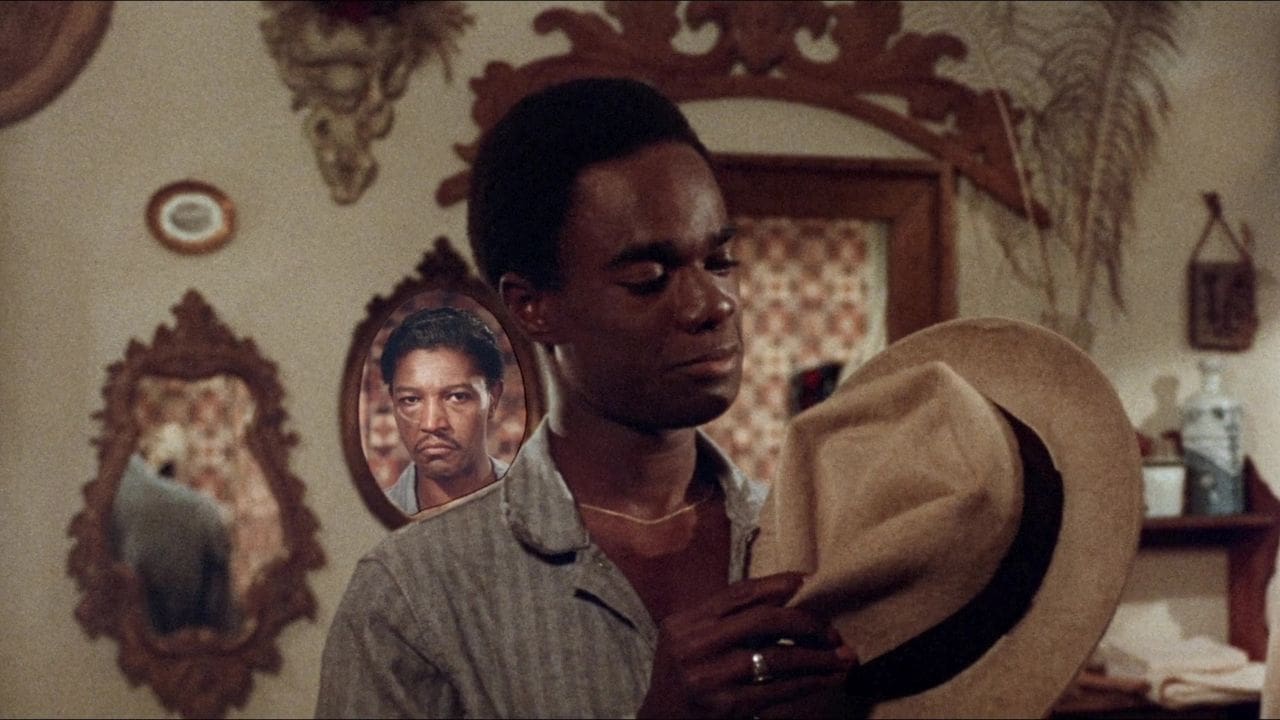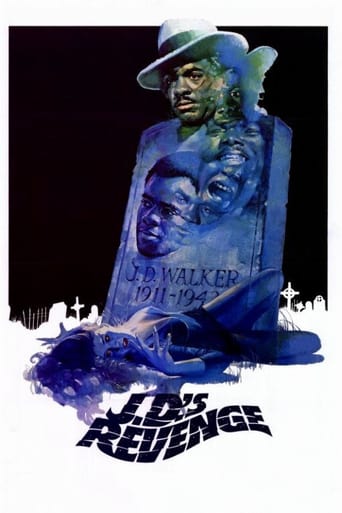

Warning- Extensive spoilers--JD's Revenge was a horror thriller released in 1976. Hitting theaters near the wane of African-American themed genre films, it was released by American International Pictures, which had become perhaps the most prolific American studio to produce 'blaxploitation' movies.Glynn Turman stars as Ike Hendrix, taxi driver and law student in New Orleans, who has a live-in girlfriend, Chrisette (Joan Pringle). A night on the town with another couple brings the group to a stage hypnotism show. During the show, Ike somehow is possessed by the spirit of J.D. Walker (john smith), a local hoodlum active during the 1940s who met a violent end at a meatpacking plant. Shortly, Ike begins to exhibit odd behavior—he buys a vintage used hat, has frequent headaches, but soon his behavior becomes sinister as J.D.'s influence comes to the fore.Terrorizing cab riders and womanizing are among the sins J.D. commits with Ike's face. Of particular interest to J.D. is the reverend Elija Bliss, who pastors a popular church in town. As played by Gossett, Reverend Bliss likes to use boxing metaphors in his sermons; his brother Cleotis apparently handles the business affairs for the church, but based on his dialogue he is not remotely the believer that Elija seemingly is. Indeed, Cleotis 'reminds' Elija that the church is just a barely-veiled hustle, and sends some ushers to rough up Ike when he takes Elija's lustful daughter home.Pros New Orleans is an interesting change of pace from the most frequent genre settings of New York (Harlem) or Los Angeles. Bourbon Street and other locales are showcased. The film handles Ike's internal struggle fairly well—mild mannered and genial normally, smug and swaggering as J.D. By the film's climax the possessed Ike has permed his hair and bought a garish suit to complete his 'old-school' look. The principal and supporting actors all play it straight, which helps avoid a campy feel to what is already a high-concept story. Some unintentional humor is wrought from a doctor who suggests to stressed-out Ike that he smoke some marijuana to calm down. The same can be said for when the movie's main couples celebrate an anniversary at a topless nightclub. Slightly less humorous is Ike's pal coming up with a rather reaching justification for Ike's slapping around Chrisette while possessed.Cons The climax of the film sets up a revelation that clever viewers may likely have figured out beforehand. The epilogue is fairly cut and dry despite the fantastic series of events that just took place. Despite some mirror-image appearances, there is no verbal confrontation between Ike and J.D., which could have been interesting—instead, Ike just totally blacks out whenever J.D. takes over. There are also several subplots that the movie seems to ignore: Shortly after the possession takes place, Ike visits a pimp to place a numbers bet (hinting at a possible criminal past for Ike) but this is soon forgotten; Reverend Bliss' past suggests that he was not only a former boxer but that he was involved in some sort of racketeerism, and his current career as a pastor may not be completely on the up-and-up. Ike assaults a man after sleeping with his wife; despite Ike being identified as a suspect, this is forgotten by film's end. A possessed Ike sexually assaults Chrisette in an overlong sequence; juxtaposed with the rather pat resolution at the end, it makes her look gleefully forgiving when she should not be—on that note, most of the women in the film are murder victims, harshly abused or sexually loose.
... View MoreThe previous comment is misleading. The story starts out with JD a 1940's Gangster and all around pretty "bad" guy. His woman is killed by another gangster with a slash to the throat. Another gangster comes in and sees him standing over the body and shoots him to death. Flash forward to the 70's, a mild mannered law student and taxi driver goes to a hypnotists show. He is plucked from the audience and hypnotized. After the show he starts acting strangely and violently (even beats up his girlfriend). Somehow he is now possessed by the gangster. It also turns out that the man who killed him (Lou Gosset Jr.) is now a preacher in the neighborhood. Then things get even more interesting.
... View MoreNew Orleans, 1942: Vicious, abusive hoodlum J.D. Walker (a sneering, splendidly nasty turn by David McNight) slices a woman's throat with a switchblade, then gets promptly shot dead for committing the brutal, heinous misdeed. Cut to New Orleans in 1976: Sweet, likable, struggling law student Ike (frequent second banana co-star actor Glynn Turman, giving a fine, engaging performance in a rare substantial lead part) is possessed by J.D.'s malevolent, vindictive spirit, which transforms Ike from a harmless, mild-mannered college kid into a vile, lethal, womanizing, straight razor-toting cad who exacts a terrible revenge upon all those individuals responsible for J.D.'s untimely demise.One of the best, most frightening and effective entries in the short-lived 70's blaxploitation horror craze (prime examples of this nifty sub-genre include both "Blacula" movies, "Abby," and "Sugar Hill"), "J.D.'s Revenge" emphasizes mood over violence, with seasoned B-picture veteran Arthur ("Bonnie's Kids," "Bucktown") Marks' typically sturdy, stylish, self-assured direction and Jaison Starkes' craftily plotted script deftly milking the creepy, mysterious, unsettling Southern Gothic-style ambiance for all its worth. Said scary gloom-doom tone, further reinforced by a vivid evocation of that uniquely lazy, luscious and exotic Big Easy atmosphere and Marks' ever dark sense of humor, insinuates itself upon the viewer in a low-key, yet forceful manner. The always great Louis Gossett, Jr. offers a dazzling, dynamic portrayal of Elijah Bliss, a flashy, grand-standing, two-faced preacherman with something to hide. The lovely Joan Pringle is strong and sympathetic as Ike's concerned girlfriend Christella. Harry May's gorgeous, polished cinematography gives the film a sumptuous professional sheen which totally bellies the low budget. The eerie, groovy, understated score by Robert Prince (who also co-wrote the forgettable ending credits theme song "I'll Never Let You Go") is likewise on the money fine. Reportedly one of Samuel Jackson's longtime favorite movies, this baby rates as a real nice one all around. And Turman does wonders in a touch, demanding part; ironically, Turman was ultimately dissatisfied with how the film turned out.
... View MoreSome of the best scenes in this movie take place after Ike (Glynn Turman) has been totally taken over by the late hustler, J.D. Walker. The scene when he walks into a New Orleans club dressed in a 1940's hat and suit, spats on his feet, and his conked hair has to be seen to be believed. Turman does a remarkable job switching back and forth between struggling law student Ike, and J.D., the razor-toting dead hustler out to revenge the death of his younger sister. Overall, this is not a bad film, but some aspects of the plot are muddy. A moment when Ike plays the numbers (what we know as the lottery today), suggests that he may have had a criminal past, but it's not explored further. We learn from flashbacks that Elijah Bliss (Lou Gossett, Jr.) was a hustler, and are given hints in the present story that his current job as a preacher may be a scam. Judging from his sermons, Elijah may have been a boxer too, but that is not fleshed out, either. The conclusion of the film leaves some unanswered questions, as well. Despite of some weak plot points, and misogynistic attitudes, this is still an enjoyable movie.
... View More